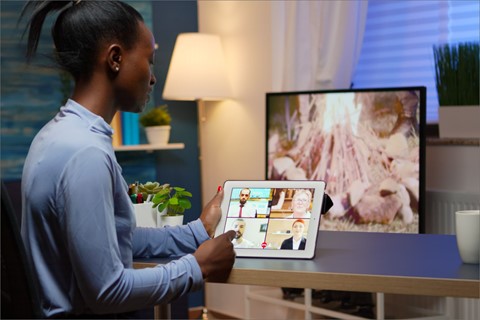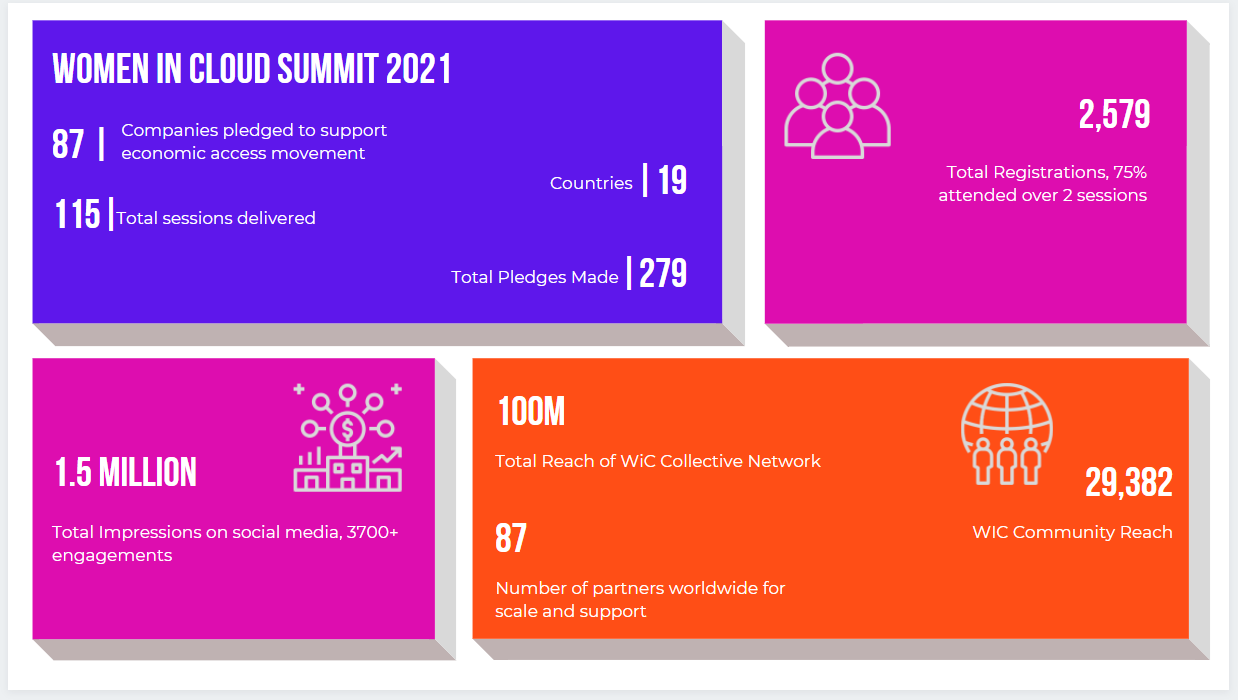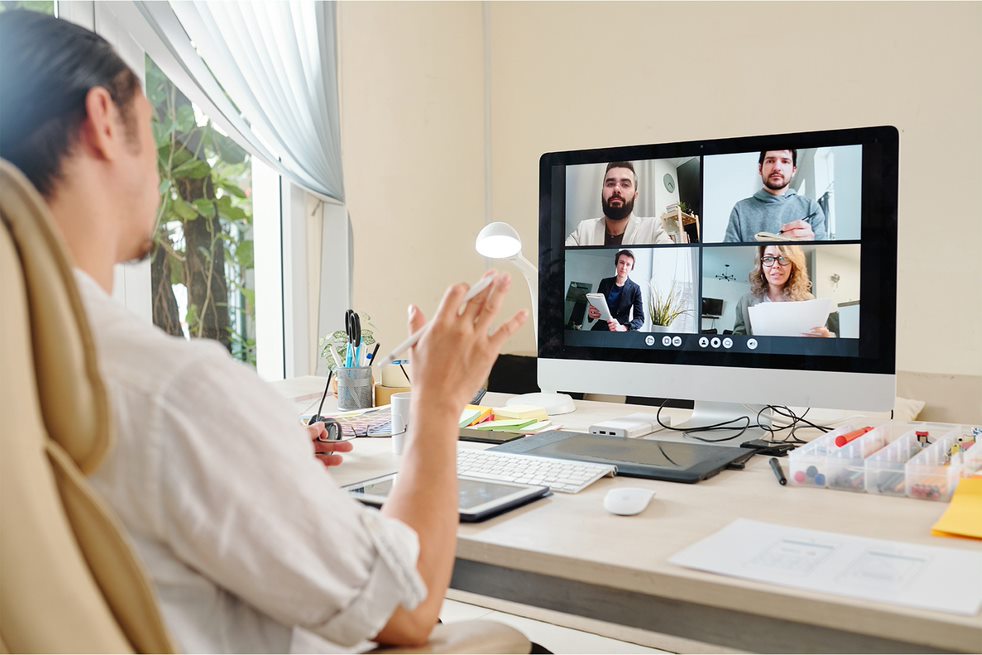
Jan 7, 2021 | Marketing, Tech, Virtual Events
Achieving your virtual event’s goals can be defined as success. But how do you get to know if your event achieved the event’s goals? How do you calculate the Return on Investment (ROI) of your event, which will help you understand whether your event produced the results you anticipated or not?
Curious?
Speaker Engage team hosted a webinar on the planning and realization of Return on Investment (ROI) for the virtual event. The group of experts – Chaitra Vedullapalli, Erin Northern, Raisa Noelle, Samira Rehman – went to great lengths to clarify the intricacies of ROI and its advantages.
The committee discussed their most recent event, the WiC Digital Summit 2021, to explain how they used the best practices to achieve a positive outcome.
Deeper into the discussion, the panelists explored the attendee’s perspective and what they expect from an online event or webinar. The experts explained their efforts to produce high-quality content, as the content is the lifeblood of every successful event. The better your content is, the higher will be your ROI.

Key Takeaways
- Enabling Value: Value addition is something that all virtual event attendees search for. If the event adds value to their time spent, they will likely attend the company’s other activities.
- Platform selection: The webinar addressed the proper platform selection process, where it was unanimously agreed that creating an inviting environment where all attendees feel comfortable and engaged is critical. The platform plays a significant role in customer engagement and helps gain a strong return on investment (ROI).
- Social media: Social media is at the forefront of today’s marketing environment. Creating sharable social media posts is critical for every event. The advantages and disadvantages of social media were discussed in-depth.
- Event layout and formation: If the event organizers focus on proper event channeling and formation, they can gain good returns (ROI) and a successful event.
- Event’s timing: Choosing the right time will help you gain more attendees and ensure a smooth run of your event. The event should not be held before lunchtime, too early in the morning, or too late at night.
There were several issues that the panel discussed and clarified how to resolve them using the proper approach efficiently. The primary aim of the webinar was to assist event planners in finding their event’s blind spot and figuring out how to get it fixed as quickly as possible.
Speaker Engage and Speaker Management
The panel discussed how speaker management plays a crucial role in the success of any virtual event. The event’s reach will soar to new heights if the coordinator chooses a well-informed and accomplished speaker for the event. A speaker who will address the event can advertise the event from their social media and entice more participation, which would help the event.
As an event management SaaS, Speaker Engage helps the event facilitator organize their event quickly and efficiently. To make an organizer’s life more straightforward, the platform serves all on one plate. With its robust marketing features like bulk emailing and social media promotion, the Speaker Engage minimized event coordinators’ efforts in its publicity.
The webinar was more than just meeting prominent voices; it also introduced game-changing strategies for the event planning and organizing community. The panelists shared their perspectives, which are vital to any event’s performance when producing a healthy Return on Investment (ROI).
Watch the entire webinar to get a more profound understanding.
YouTube description:
Excerpts From a Webinar on Understanding ROI Planning and Realization for Successful Virtual Events
A webinar is not just an informative event. It is also an excellent opportunity to advertise your company to potential customers. This can only happen if the audience takes away something substantial from the webinar, or there is a danger that it will be like any other webinar. Watch this video to learn the key takeaways from a webinar on how to host more informative and value-driven webinars hosted by SpeakerEngage.
#ROIplanningandrealization #eventmanagementSaaS #eventplanningandorganizing
Watch the entire webinar to get a better understanding.

Dec 24, 2020 | Event Industry, Marketing, Tech, Virtual Events
There was a time when it was understood that ‘events’ meant ‘in-person’ events. But not anymore. Marketing has changed a lot from the last year or so. One major development is virtual events have taken center stage in marketers’ priorities.
It is true, we are missing out on experiences such as traveling and meeting people in person. But virtual events have managed to hold their fort and are doing surprisingly very well. According to a poll conducted by the Professional Convention Management Association, 81% of people expect to hold more virtual events in the future. And there is good reason to. Let’s see some major reasons why virtual events are useful and why an increasing number of people are adopting them.
1. Virtual events can be produced for less
Virtual events not only cost less to set up than in-person events, they are also open to more people. All you need is an invite and access to the internet to attend one. With a virtual event, you don’t have to make arrangements for venues, travel, or hospitality. If you plan and execute virtual events properly, they can give you more ROI than in-person events.
2. You can plan and execute a virtual event in less time
Virtual events don’t require you to transport people or physical displays, making them faster to set-up than in-person events. A small virtual event can be set-up and promoted in as less as 3-6 weeks. A large virtual event (with thousands of attendees) could take more than six weeks to set up. Meanwhile, it can take as long as eight weeks to set up an in-person event.
3. Attendees are more likely to attend a virtual event
Earlier, many people couldn’t attend as many events as they wanted to because they were averse to traveling. Many also had busy work schedules, in addition to the family and home responsibilities. All these ate into their event plans, and only people who absolutely couldn’t miss an event made it to in-person events. But the rules have changed now. Online hosting of events has made events accessible to more people. Today, we see more people attending virtual events than ever before.
4. Virtual events connect people from over the world
One of the significant disadvantages of in-person events is that they are limited by geography. For example, you want to attend a Metallica concert in New York City but you stay around 100 miles away, in Hartford, you have to think twice about attending. Virtual events give an excellent opportunity for cross-border networking because they are not limited by geography. If you are a business or event planner with global aspirations, this is a huge plus point. Here’s a post on the rise of the event technology strategist.
5. Virtual events can lead to more effective conversations
Holding a virtual event often costs a fraction of what it takes to have an in-person event. They also attract attendees from diverse locations. This makes it possible to hold virtual events for even niche events. With virtual events, you also have an opportunity to really impress your audience, rather than merely skimming the surface. Moreover, attendees at a niche virtual event are more likely to be interested in your product (or service) than others. Here’s a post on how to effectively market a virtual event.
6. Virtual events give a lot of insights and data
Asking people to fill up forms during and after in-person events is a bit of a hassle. But you need that data to find out what type of people are attending your event and other particulars. A filling of forms precedes many virtual events. Virtual events are also easy to record. This is an invaluable resource for salespersons who want to find prospects for their product (or service) or marketers who wish to find data points to fine-tune their strategies.
6. Virtual events appeal to high-profile speakers
High-in-demand speakers are hard to pin down for an in-person event unless you offer something substantial in return. In fact, you may not be able to get a high-level executive even from your own company to speak at your in-person event, especially if they have to travel a lot. But in virtual events, there is no traveling involved. This feature makes virtual events more attractive to high-in-demand and C-level speakers.
7. Virtual events are much easier to scale than in-person events
In-person events can be scaled only to the extent of the capability of the venue. With virtual events, you have the option of using a videoconferencing app or a dedicated streaming service. As a result, virtual events are much easier (and faster) to scale to accommodate a large number of people at a fraction of the cost. And more people mean better reach and visibility.
8. Virtual events can keep pace with your offerings
If you are about to launch a new offering or make a significant announcement regarding your product, and you want it to be interactive, a virtual event can help. Now, you no longer have to wait to accumulate a large product pipeline and introduce all of them at once at an in-person event. Instead, you can make more frequent announcements via a virtual event.
9. Virtual events help you qualify leads more quickly
It is possible to integrate appointment calendars with virtual events, allowing you to follow-up with prospects, even as your events are running. In short, virtual events enable you to qualify leads more quickly and lead them down the sales funnel faster.
Running a virtual event is both easy and difficult at the same time. You not only have to come up with creative ideas to make your event attractive to your audience; you also have to find the right technology to ensure the event passes off smoothly. Here’s a post on the latest trends in event technology.
How good it would be if you had a platform to curate and engage with at least your speakers! But don’t give up yet because have some good news for you!
Speaker Engage is a fully-integrated, cloud-based platform designed by event organizers for event organizers that helps you curate and delight speakers & sponsors by streamlining the event planning and execution process. Sign up for a demo today!

Dec 24, 2020 | Event Industry, Marketing, Tech, Virtual Events
In the wake of the coronavirus pandemic, many businesses and event planners switched to virtual events rather than cancelling their pre-decided in-person meet. As a result, virtual conferences and events have become the new normal. Businesses may now directly reach thousands of people in different locations at the same time through virtual events.
However, it is not easy to conduct and manage virtual events. It requires thorough planning and an investment of time and effort for its successful promotion and execution. Your event marketing strategy must be on point to provide participants with a terrific experience and ensure the event’s success.
Here are a few tips on how to promote a virtual event in a better way to meet all of your objectives.
A- Create an attractive landing page for the event
A landing page is where the users go to in order to learn everything about your event. Since the first impression has to be the best, the landing page you develop for your event must stand out with vital information presented appealingly. The landing page should give out the complete information regarding the event, with the registration link pushing visitors to join the event. The page should be detailed and attractive to draw the attention of the user. Some of the essential information that has to be added to the landing page are:
- Time
- Date
- Agenda
- Speaker information
- Sponsor information
- Registration link
- Payment option (if any)
B- Make use of existing database for email marketing
Email marketing is still the most effective marketing strategy to drive results. Send out email newsletters with a clear subject line to your target audience. Come up with an engaging email campaign and share valuable information to educate your audience about the event updates. The email should have complete information regarding the event. Make sure to hook your audience with exciting updates and offers, such as discounts and early-bird offers.
C- Leverage your social media channels
Promoting your event on social media platforms is one of the best ways to reach more people. And there are endless ways to do so. Understand your audience and their behavior patterns; this will help you come up with the perfect plan to market your campaigns. Craft distinctive, appealing social media posts to increase engagement and generate leads. Here are some ideas that you can follow:
- Spread the word by creating a hashtag.
- Share eye-catching images and videos optimized for each platform.
- Publicize the event’s unique selling points widely.
- Promote early bird offers and deadlines, driving urgency to boost registrations.
- Increase engagement by creatively introducing the host.
D- Boost promotions through your partners, sponsors, and speakers
Involving your speakers, partners, and sponsors in the promotion efforts of your event will help you gain exponential results. When the speakers promote your event on their social media channels with the relevant content and hashtag, it will help you get their audience to the event. And, when the sponsors and partners promote your online event, it reaches new audiences and has tremendous effects on the turn up. Encourage them to share the event’s details with their contacts and followers so that the word gets out. Sharing the registration links, social media page links, graphics, announcements, etc., is a step in the right direction.
E- Prepare attractive videos for promotion
We all love watching original video content. Videos are a crucial aspect of your event promotion strategy. Several studies explain that with a 2-minute video, you can hit the engagement jackpot. Thus, create a short video (no longer than 2 minutes) showcasing vital information regarding the event and share it on all social media channels and YouTube. Make it funny and engaging, and use your social media hashtag somewhere in the video.
Summary
Virtual events can seem tricky. However, with a proper and sound marketing plan, you can easily promote your event, which will help you drive as many participants as possible. Follow the ideas mentioned above and promote your event successfully.
If you are planning to organize and promote your virtual event, contact us. We will help you ease your task and guide you every step of the way.
YouTube description: Promoting a virtual events sound very tricky. But it doesn’t have to be. Watch this video to learn a few tips and tricks on how to promote your virtual event in the best way possible.






